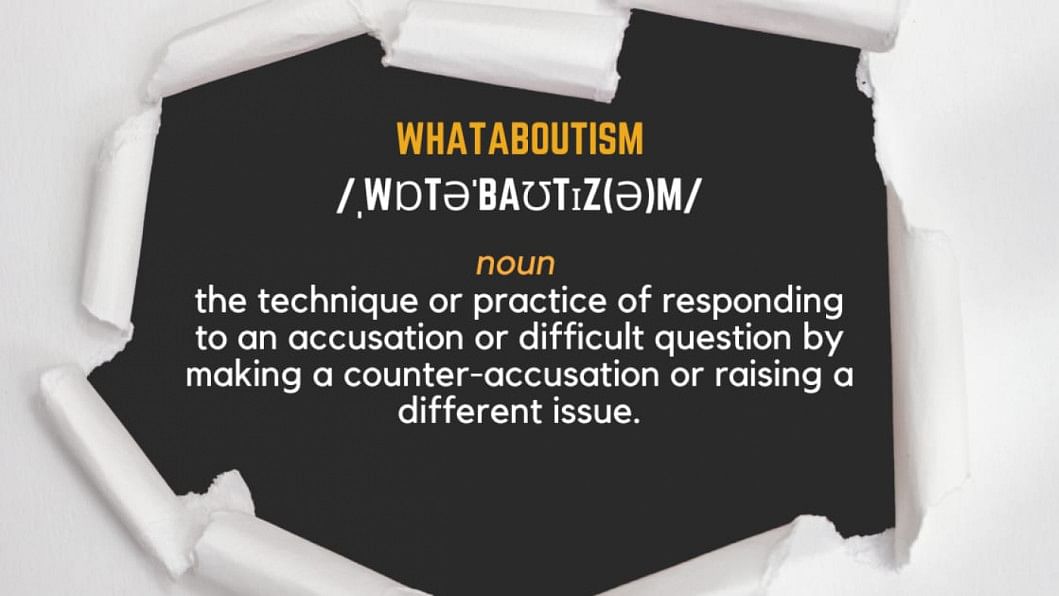The rhetoric of 'it happens' and whataboutism in political apologia

During my time as an academic at the University of Dhaka, there were some whisperings and mutterings of bewilderment among campus insiders about a political appointment in early 2009. In that air of confusion and perplexity, I overheard a conversation between two senior academics in the corridors of Kala Bhaban. Let's name them Y and Z. Y was known for his sympathy for the party in office and Z was a political incognito.
Z walked to Y and exclaimed: "Ki holo eta?!" ("What just happened?!"), expressing his shock over the political appointment and anticipating a word of condemnation from Y.
However, Y adopted a cavalier attitude towards what Z considered a serious matter. With a broad smile on his face, Y said: "Eta rajniti." ("This is politics.").
In the above case, the excuse to condone misdemeanours or indiscretions is: "it happens." Unfortunately, this ploy is common among both unlettered and highly educated people and is used to defend, and provide blind support to, one's political camp. Worse, this pretext is applied selectively. The same people would become moral absolutists and take a fiercely antagonistic stance if comparable offences were committed by people of opposing political parties.
The rhetoric of whataboutism is another apologist strategy for condoning the various types of human rights abuses perpetrated by a political party of one's affiliation or by a government of one's choice. It is a diversionary tactic to deflect attention from atrocities occurring under people's noses to other past events or trends. This argumentative technique is used by pseudo-neutral, partisan analysts, commentators and intellectuals. They resort to this logical fallacy to avoid the moral responsibility to intervene in instances of political authoritarianism, repression, and mass victimisation. The intention is to make the public indifferent to ongoing political oppression and to absolve the perpetrators of responsibility.
The specious pretext of whataboutism seems to have gained momentum with the defenders of the current government in Bangladesh that is embroiled in innumerable controversies and allegations of gross human rights violations.

Electoral fraud and other forms of manipulation overshadowed the last two general elections – one non-participatory and the other tainted by nocturnal ballot stuffing. Innumerable opposition leaders and activists have also been subjected to forced disappearances, beginning with the disappearance of Dhaka City Corporation councillor Mohammad Chowdhury Alam on June 25, 2010. Both the cries of their children and the cries for justice have been falling on deaf ears. Limiting freedom of the press and gagging the expression of dissent have now taken on an institutional and legal shape, thanks to the Digital Security Act (DSA) 2018.
When conscientious intellectuals and citizen groups raise these issues of misrule to generate debates, ruling party sympathisers and peddlers of official narratives defend the regime by skilfully deploying whataboutism. Thus, they attempt to stifle legitimate political criticism and seek to dismiss the charges of current human rights abuses by referring to earlier precedents.
When the advocates of whataboutism are called on to condemn wanton harassment of opposition leaders, activists, and of journalists and writers (for exercising freedom of expression), they say that such repression is not new and they also happen in other countries.
Oppression and injustice in any shape or form are wrong and abhorrent, and suggest inherent weaknesses of the perpetrators. Our condemnation of such acts must be absolute, without any subterfuge or reservation.
To use previous incidents of human rights violations to condone those of the present is hypocrisy and a macabre mockery of the past and present victims.
Perhaps, with a change of political power in Dhaka, today's proponents of whataboutism could change their colours. Such metamorphosis of Bangladesh's intelligentsia has happened, especially in relation to the rise and fall of Hussain Muhammad Ershad. As the Associated Press had reported on December 30, 1990: "Newspapers, including government-owned ones that once carried only laudatory accounts of Ershad's public deeds, now print saucy stories full of allegations of corruption and clandestine romances."
Freedom-loving and peace-and-justice-promoting writers and intellectuals should be above partisan politics and have the courage to stand firm for truth and justice. Using the tedious rhetoric of "it happens" and whataboutism to defend a particular political group is a sign of intellectual timidity.
As it appears, our country is poised for a further downward spiral – a total political, humanitarian, and economic crisis. If things turn worse and if slavery and sycophancy are the only options on the table for the educated gentry, it will be too late to wake up to the country's realities and to our responsibilities. The earlier we understand this, the better.
Dr Md Mahmudul Hasan teaches English and postcolonial literature at International Islamic University Malaysia. Email: [email protected]

 For all latest news, follow The Daily Star's Google News channel.
For all latest news, follow The Daily Star's Google News channel. 










Comments